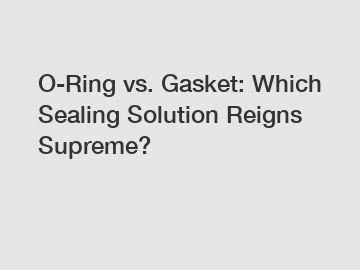Feb. 02, 2024
Mechanical Parts
O-Ring vs. Gasket: Which Sealing Solution Reigns Supreme?
In the world of engineering and manufacturing, choosing the right sealing solution is crucial for ensuring the proper functioning and longevity of mechanical systems. When it comes to sealing components, two popular options often come into consideration: O-rings and gaskets. Both serve the same purpose of providing a reliable seal, but which one reigns supreme? Let's delve into the topic and evaluate the strengths and weaknesses of each to determine the better sealing solution.
1. Material Characteristics:

O-rings are typically made from elastomers such as rubber or synthetic polymers, which offer excellent flexibility and resistance to a wide range of temperatures and chemicals. On the other hand, gaskets are commonly constructed from various materials including rubber, cork, silicone, or even metal, imparting them with a broader suitability for specific applications.
2. Versatility:
O-rings are compact, circular, and can be easily installed in grooves or recesses, making them a preferred choice for applications with limited space. Conversely, gaskets are available in a wide array of shapes and sizes, allowing them to accommodate irregular or non-circular sealing surfaces. This versatility makes gaskets more suitable for sealing larger or non-standard applications.
3. Pressure and Temperature Resistance:
O-rings are generally better known for their excellent pressure and temperature resistance attributes. Due to their rounded shape, they evenly distribute pressure over a larger surface area, enabling them to withstand higher pressure applications. Gaskets, on the other hand, may require reinforcement or multiple layers to handle extreme pressures, making them more suitable for lower pressure applications.
4. Leakage Prevention:
When it comes to preventing leakages, both O-rings and gaskets have proven their effectiveness. O-rings, due to their circular shape, offer a more continuous and uniform sealing surface, making them highly reliable for preventing leaks in dynamic applications such as hydraulic or pneumatic systems. Gaskets, while also capable of creating reliable seals, are often used in static applications, such as flange connections, where they can easily maintain a tight seal over extended periods.
5. Ease of Installation and Replacement:
In terms of installation and replacement, O-rings typically offer a simpler process as they can be easily inserted into grooves or recesses. Their compact size also makes them easier to handle and maneuver. Gaskets, being larger and available in various shapes, may require more effort during installation. Replacing gaskets often involves removing entire components or sections, which can be more time-consuming and labor-intensive.
6. Cost Considerations:
Considering the costs, O-rings tend to be more economical as they require less material, and their manufacturing process is generally less complex. Gaskets, given their larger size and varied material options, may be more expensive depending on the specific application requirements. However, it's important to note that cost shouldn't be the sole determining factor, as the overall performance and suitability for the application should also be considered.
In conclusion, both O-rings and gaskets have their unique advantages depending on the specific sealing requirements of a given application. O-rings excel in compact spaces, higher pressure applications, and dynamic systems, offering superior flexibility and resistance, while gaskets come into their own for larger or irregular sealing surfaces and static applications. It is crucial to thoroughly evaluate the application parameters, system dynamics, and material compatibility to make an informed decision on which sealing solution best meets the requirements. Ultimately, the superior sealing solution between O-rings and gaskets is contingent on the specific application, emphasizing the need for careful consideration and evaluation before making a final choice.
For more o-ring vs gasket, custom oil seal, tc rubber oil sealinformation, please contact us. We will provide professional answers.
If you are interested in sending in a Guest Blogger Submission,welcome to write for us!
All Comments ( 0 )